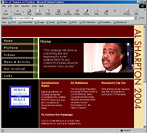
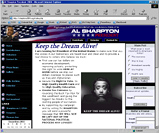
| After pursuing an exploratory effort throughout 2002, Rev. Al Sharpton filed papers establishing a presidential exploratory committee with the FEC on January 21, 2003. Frank Watkins started as campaign manager of Sharpton Explore 2004 in mid-April 2003 and continued to September; on September 30, 2003 Sharpton named Charles Halloran to serve as his campaign manager. |
| Campaign Manager | Charles Halloran |
| Deputy Campaign Manager | Michael Pitts |
D I S T R I C T O F C O L U M B I A (January 13 primary)
| DC Director | Joe Ruffin |
S O U T H C A R O L I N A (February 3 primary)
| South Carolina State Director | Roderick Scott |
M I C H I G A N (February
7 caucuses)
(office in Detroit)
N E W Y O R K (March 2 primary)
On November 10, 2003 the campaign announced the formation of a "national network of business, community and political leaders designed to enhance Sharpton's local fundraising, generate volunteer support, coordinate local political events, and interact with communities of interest on behalf of his campaign."
 |
 |
| December 2003 overhaul. |
| Campaign Manager | Frank E. Watkins |
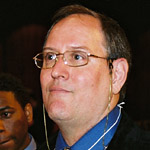 |
(Started as campaign manager on April 15, 2003, resigned Sept 2003). Watkins is taking a leave of absence from his position as press secretary/communications director in Rep. Jesse Jackson, Jr.'s office, where he has worked for almost seven years. Previously he worked for Jackson, Jr.'s father, Rev. Jesse L. Jackson for 27 years. Born in St. Louis, Missouri, Watkins attended Anderson College in Indiana, 1961-65 and Anderson School of Divinity, 1965-68. (He chose Anderson because Dodgers' pitcher Carl Erskine was a coach there. Watkins played semi-pro ball for seven years). At Anderson, Watkins was active in the civil rights and anti-war movements. He first met Jackson in 1967 when looking at various forms of urban ministry. After candidating in five churches, Watkins started at Operation Breadbasket on May 1, 1969. He was brought on the payroll at PUSH in December 1971, and worked in a variety of positions there, succeeding Bill Cherry as press secretary and communications director in 1975. Watkins tried unsuccessfully to get Jackson to run for president in 1980. He serve as press secretary on Jackson's 1984 presidential campaign and as national political director on Jackson's 1988 campaign. |
| Question: What is the secret to a successful
campaign?
"Having a message that has broad-based appeal and driving that message home every day." -Frank Watkins |
| State Coordinator | Kevin Gray |
| Campaign Chairman | Roberto Ramirez |
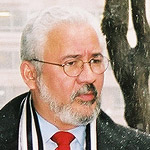 |
Roberto Ramirez, a Puerto Rican American, served as chair of the Bronx County Democrats from 1994 to early 2002. He heads the MirRam Group consulting firm. Ramirez ran for NY Assembly unsuccessfully in 1986, was elected to the Assembly in 1990, and ran unsuccessfully for New York City public advocate in 1993. Ramirez moved to New York City from Puerto Rico at age 19. He is a graduate of Bronx Community College and NYU law school. |
In February 2002, Rev. Sharpton embarked on a "Getting to Know You Tour." In New Hampshire on February 17, he met and greeted the congregation at New England Pentecostal Ministry in Pelham, spoke at Keene State College, (crossed over to White River Junction, Vermont to visit a community action program), and preached at Rollins Chapel at Dartmouth College in Hanover the next morning he did a breakfast with fellows and interns at Hanover Inn. In Des Moines, Iowa on February 26, he breakfasted with local clergy at the Creative Visions Center, had lunch with officials and community leaders at Corinthian Baptist Church, spoke at Des Moines Area Community College, and preached at Union Baptist Church.3 However, the "tour" petered out although Sharpton continued his travels.
Sharpton's press secretary Rachel Noerdlinger stated on March 1, 2002,
"We're in the very early stages. We're researching issues, familiarizing
people with the idea, choosing operatives from different regions for mobilization
efforts and crucially, assembling a finance committee to ascertain how
this will happen." By mid-June 2002 it had established a finance
committee with Don Coleman, CEO of GlobalHue, and Pierre Sutton of Inner
City Broadcasting serving as co-convenors, it claimed "operatives in 30
states," and it had launched a web site. On September 13, 2002 the
Sharpton Explore 2004 Committee held its first fundraiser.
On January 21, 2003 Sharpton filed papers establishing a presidential
exploratory committee with the FEC. Bronx Democrat Roberto Ramirez
was chairman of Sharpton Explore 2004.
Notes
1. At his August 18 press conference Sharpton said he
would do a September tour of 10 key cities around the country, and an early
October freedom bus tour in New Hampshire, however the September 11 attacks
slowed the pace of these activities. On December 1, 2001 at the "State
of the Black World Conference" in Atlanta, Rev. Sharpton continued to express
clear interest in a presidential run, speaking at a forum on "The Sharpton
for President Campaign 2004: Which Way Black America?"
2. Early meetings: New York on January 29, 2002 and Philadelphia on February 23, 2002.
3. Rev. Sharpton stated through his spokeswoman, "I felt
that I was well-received by residents in both New Hampshire and Iowa and
intend to spend more time in each area as I continue my 'Getting to Know
you Tour' over the next few months. In New Hampshire, the students
at Dartmouth and Keene State College asked fair and intelligent questions
about my positions ranging from education, the economy, campaign finance
and election reform, to energy and the environment, civil rights, AIDS,
and national health regulations and standards. In Iowa, community
members in Des Moines inquired about my push for election reform and how
I would make this a central part of my platform in 2004, along with pertinent
questions about my positions on welfare reform, housing, and agriculture
as it relates to the state of Iowa. The diversity of people I visited
with in each state expressed strong emotion about the need for progressive
people-based policy in America and the need for fairer standards for all
citizens. A common denominator on both trips was the aspect of listening."
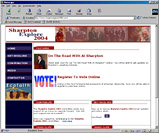
Sharpton Explore 2004 website
remained static for many
months.
Copyright © 2003 Eric M. Appleman/Democracy in Action.